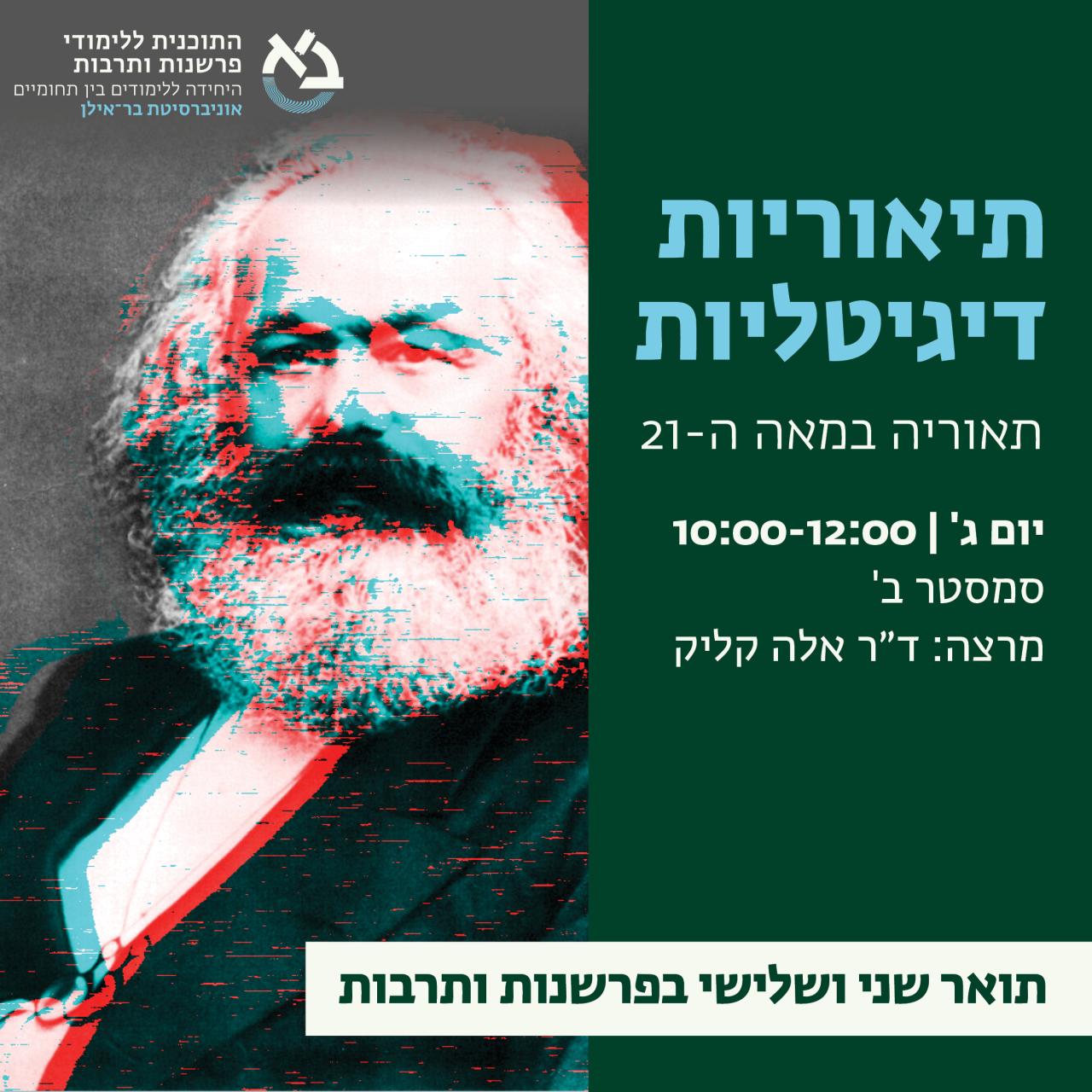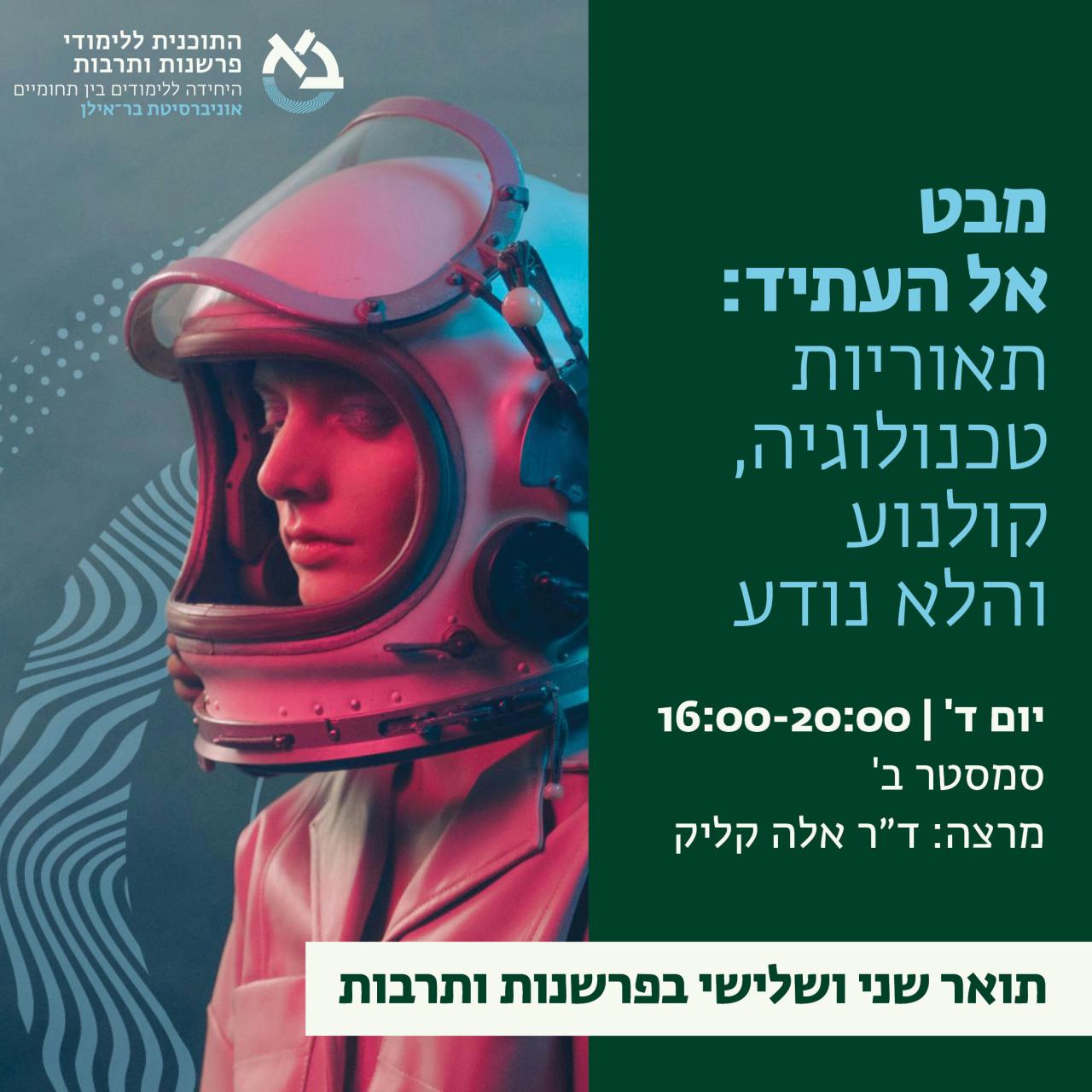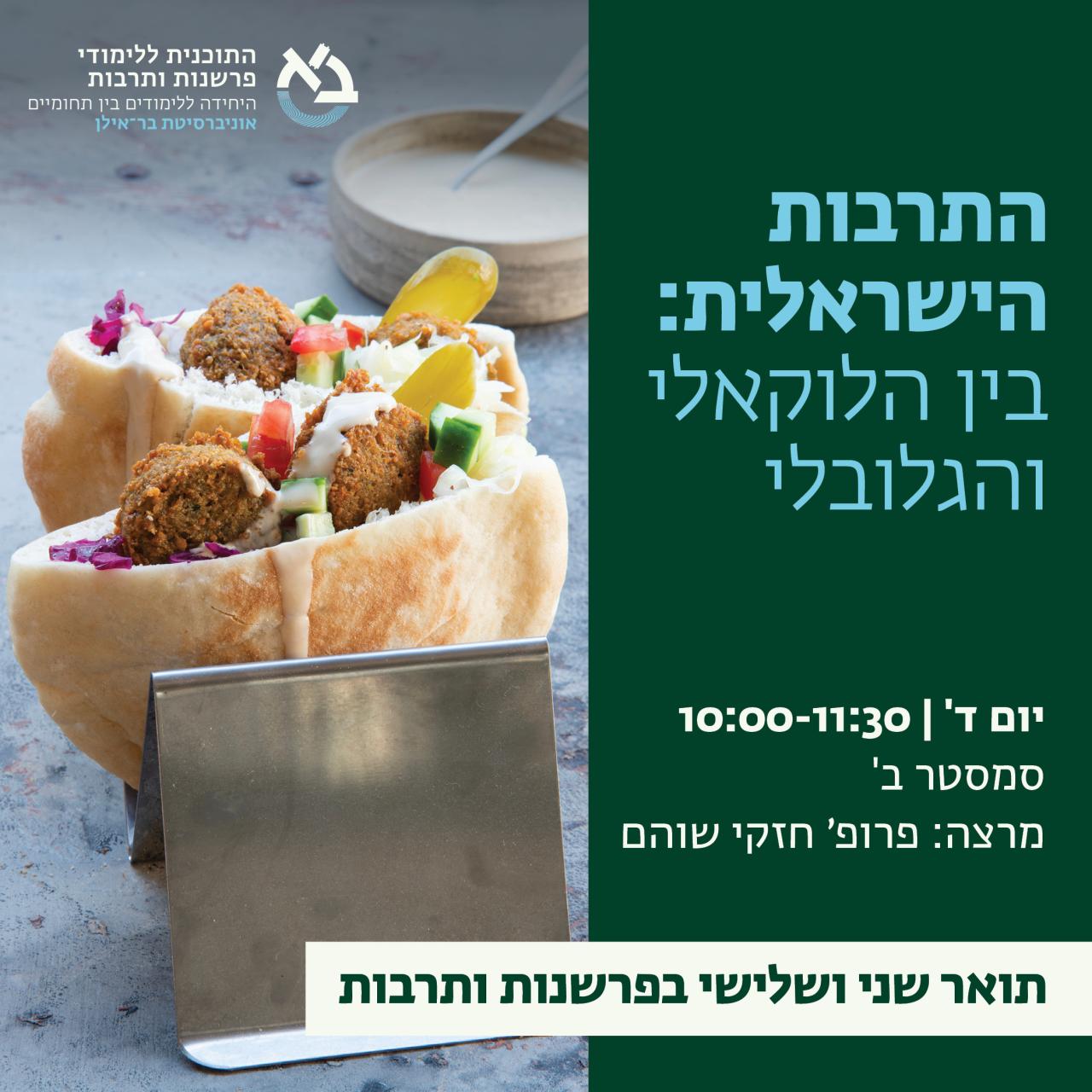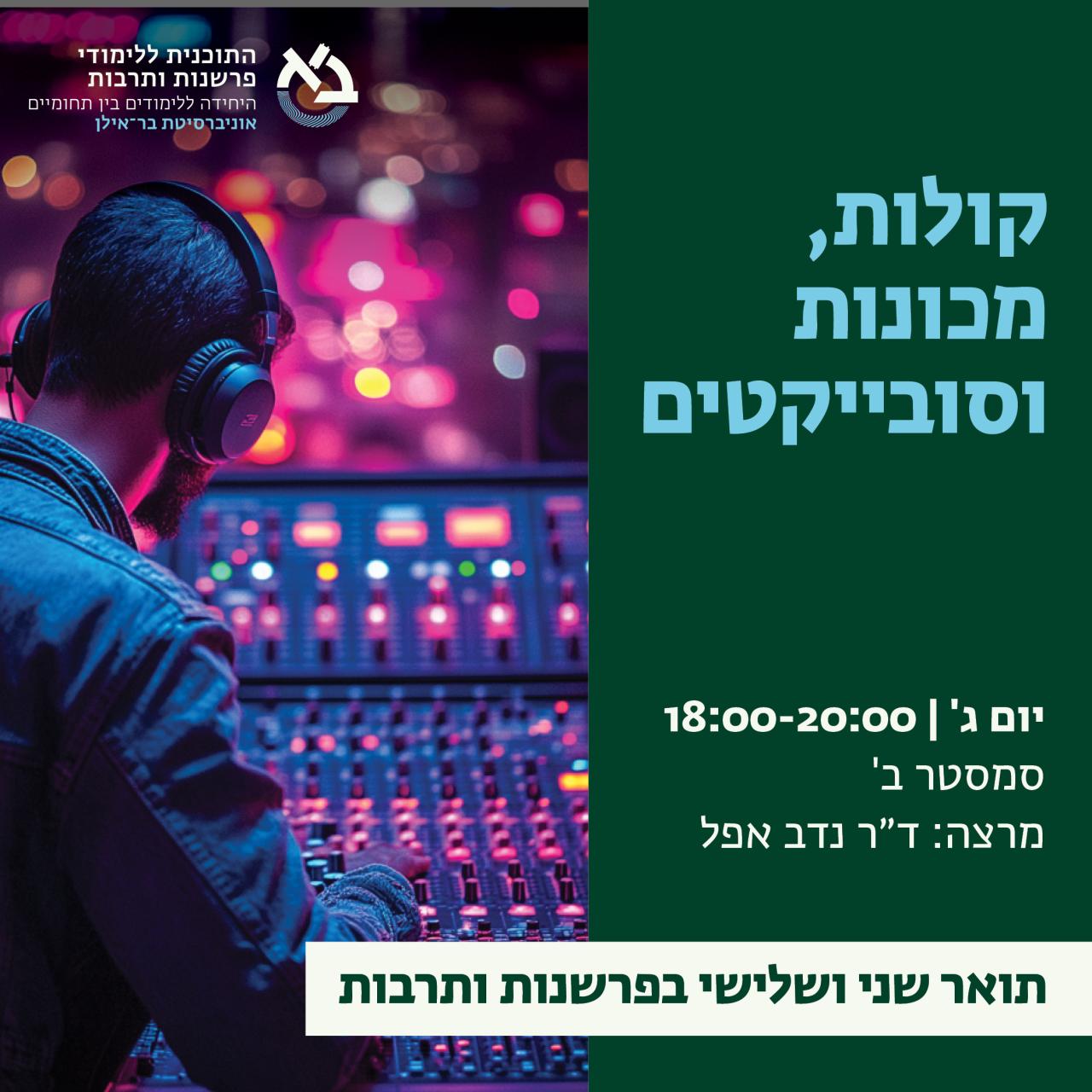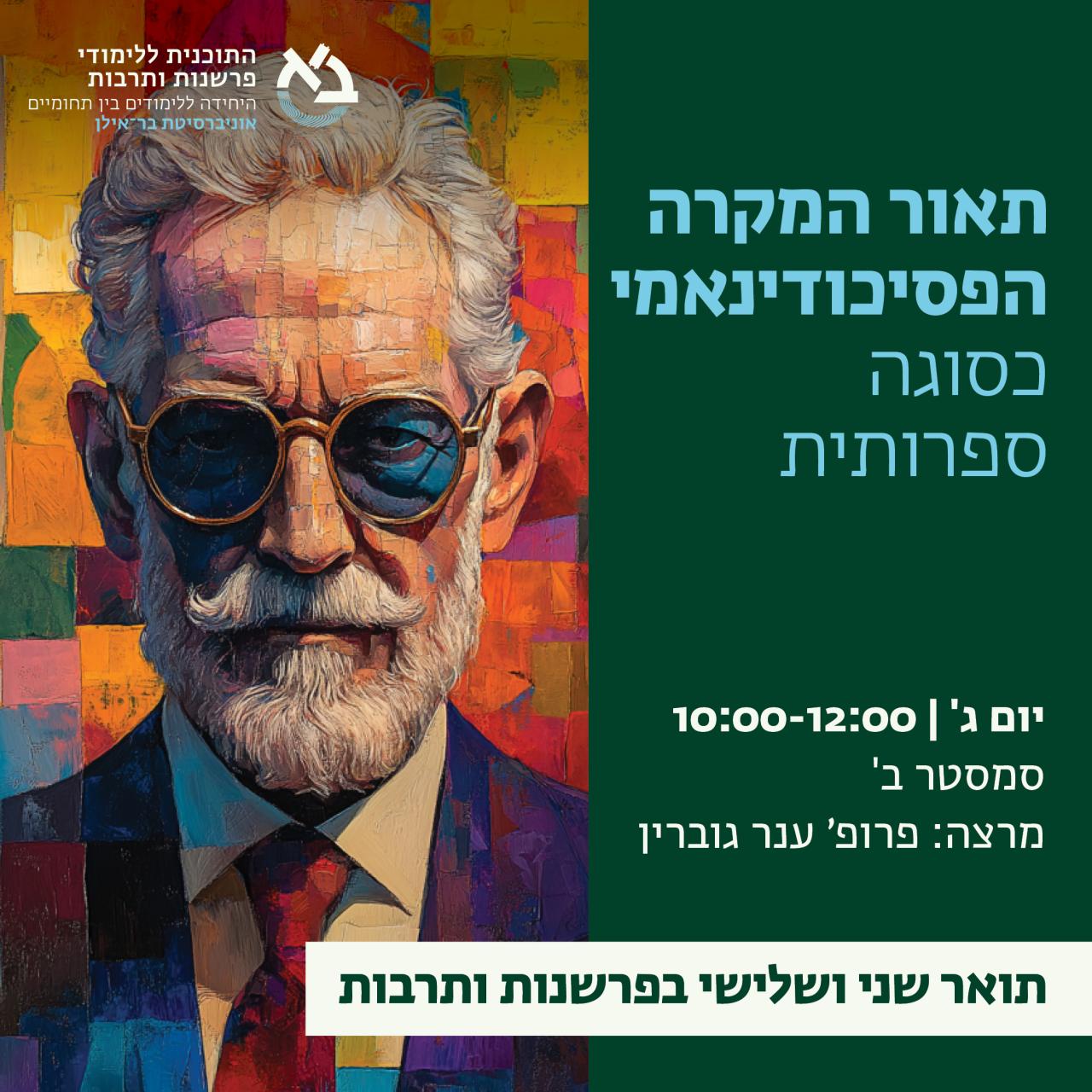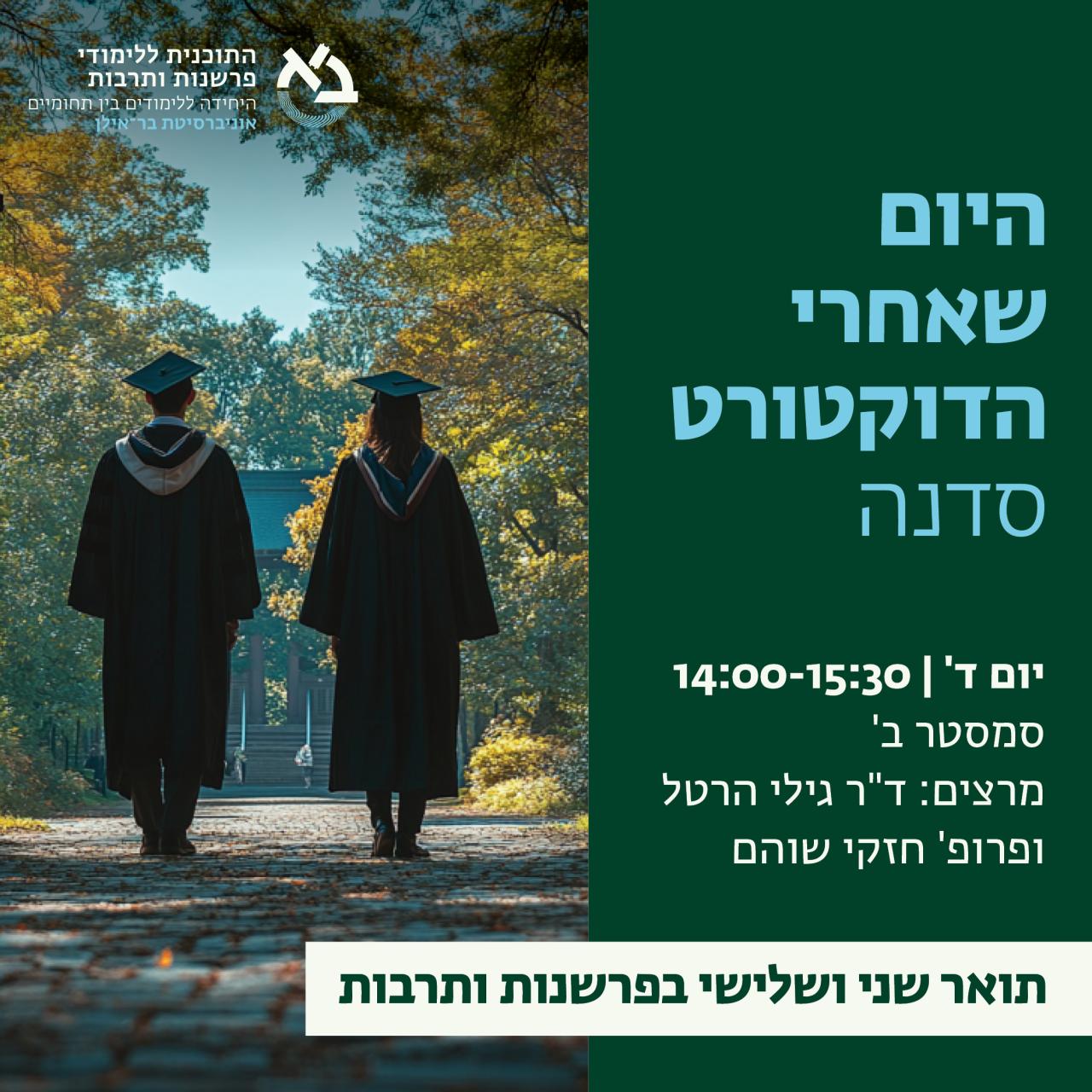Our Courses
Elective Courses Open for Registration – Spring Semester
Required Courses of the Program
|
Hermeneutics | Prof. Roni Miron
This course will explore the thought of key figures who shaped modern interpretative theory, from Friedrich Schleiermacher to Paul Ricoeur. It will examine the fundamental assumptions that enabled the development of hermeneutics, the central questions that have driven and accompanied its evolution, and the major turning points in its history. Additionally, the course will discuss the influence and impact of this discipline on the humanities and social sciences, as well as on cultural studies. Based on an acquaintance with the major milestones in the history of hermeneutics and a critical examination of them, we will explore the possible interdisciplinary applications of the studied material.
View Syllabus |
|
Discourse Interpretation | Dr. Dorit Lemberger
This course explores the philosophy of language from the late 19th century to the present, focusing on the following questions:
The course will examine the characteristics of the "linguistic turn" and its impact on the humanities and social sciences by studying and discussing the methodologies of key thinkers and scholars who have shaped the field of language studies. The theoretical perspectives of these thinkers will be analyzed in class discussions, while practical exercises will apply each methodology to the reading of texts from various disciplines.View Syllabus |
|
Introduction to Critical Theories | Dr. Dror Yinon
This course seeks to explore the unique nature of critique in critical theory by examining the various contexts in which such theory has developed. The course is divided into three parts, integrating the historical and conceptual evolution of critical theories with a focused study of their key concepts.The first part is dedicated to the origins of critical theory in the works of Kant, Hegel, and Marx, leading to the Frankfurt School, where the term critical theory was coined in the sense addressed by this course.The second part will focus on fundamental concepts of critical theories, such as ideology and hegemony, with an emphasis on thinkers who do not belong to the Frankfurt School.The final part will revisit the concept of Enlightenment and examine Jürgen Habermas’s attempt to reconstruct Frankfurt School critical theory within a new conceptual framework.The philosophical and conceptual foundations provided by this course will offer a deeper understanding of theories and social movements that emerged in the twentieth century, addressing critical public debates on gender relations, sexuality, minority rights, mass communication, its impact on democratic society, and other significant issues shaping the structure and character of contemporary society.
|
|
Theory and Critique: From Psychoanalysis to Posthumanism | Prof. Liran Razinsky
Throughout the 20th century, critical voices repeatedly challenged the fundamental assumptions of Western culture, its dominant social structures, and prevailing power dynamics. With roots in the 19th century (Marx and Nietzsche) and significant intensification in the second half of the 20th century, various theoretical contributions have destabilized images, modes of thought, spoken and unspoken claims, systems of control, and established practices. This course aims to trace a series of such anti-hegemonic developments.We will begin by examining the disruptive and critical dimensions of psychoanalysis, both directly in psychoanalytic writings and through its various extensions. The course will then explore a range of thinkers from the golden age of French thought, who opposed fundamental tendencies of Western philosophy and the meta-narratives of modernity, which often manifest in institutions, identities, practices, and social relations.A central concern of critical theories has been the dominance of one group over others through mechanisms of suppression. Accordingly, we will study feminist texts, critiques of racialized thought, and challenges to colonial power structures. Additionally, we will consider how different critical movements strive for liberation in the realm of identity—toward more fluid, open, and hybrid identities. The course will conclude with an examination of the renewal of critical thought in response to contemporary challenges, including the rise of a global capitalist political-economic order since the 1980s and, more notably, the accelerated development of modern technology (contemporary technological critique and posthumanist thought).Along the way, we will analyze the modes of operation of critical thought, subjecting it to scrutiny and questioning its own scope and limitations. We will consider the role of theory and its relationship to action and practice, as well as the challenges and constraints faced by critical theory.Key concepts discussed in the course include power, domination, oppression and resistance, identity, hybridity, cultural difference, pluralism and diversity versus uniformity, openness versus closure, and the dynamics of voice and agency.
|
|
Theories of Culture: Sociological and Anthropological Perspectives | Prof. Hizky Shoham
In modern Western thought, the term culture has become something of a magical concept—simultaneously used to explain and obscure the ideological frameworks and lived realities of conceptual systems and human societies. As part of this process, the academic field known as cultural studies has gained momentum in recent decades, establishing itself as one of the leading disciplines in the humanities. This field is characterized by a relative openness to interdisciplinary and multidisciplinary research and discussion, along with greater legitimacy for engaging explicitly with political and social questions.The course aims to introduce students to the major classical and contemporary approaches in this field, with a particular methodological emphasis. It will focus on developing research tools and understanding the diverse and sometimes contradictory uses of the concept of culture, seeking to navigate the inherent ambiguity in the field without compromising its contemporary relevance or the analytical precision of its methods.The course will begin by presenting the historical background of the emergence of the concept of culture and its social and existential significance in modern Western thought. It will explore different perspectives on the concept, including high and low culture, Kultur versus civilization, material culture and technology, and complex ideological systems versus fundamental categories for understanding the world. These distinctions dictate different methodological approaches across various disciplines.Subsequently, we will examine how these varying definitions shape research approaches to key theoretical and methodological questions in cultural studies. Topics will include:
The course will focus primarily on classical sociological and anthropological perspectives while extending the discussion to adjacent disciplines such as philosophy, literary studies, and intellectual history. It will also explore the historical and philosophical contexts that have shaped the rise of the concept of culture and the field of cultural studies.View Syllabus
|
|
Key Issues in the Philosophy of Psychoanalysis | Prof. Aner Govrin
|
|
Colloquium The Hermeneutics and Cultural Studies program is an interdisciplinary and multidisciplinary program. The colloquium serves as a forum for discussion and exchange among all students in the program. Approximately every two weeks, students meet with researchers from various academic fields to learn about their work and engage in discussion.The colloquium provides students with an opportunity to engage with high-quality research in the humanities and to be exposed to diverse ways of thinking and perspectives that will enrich their own research and analytical approach.There are two alternating colloquium series:
|
Annual Courses – Academic Year 2024/25
* Between everyday language and poetic language: communication, ethics and aesthetics (Lecture / Seminar) Dr. Dorit Lemberger
* Algorithms and Humans: Subjectivity and Data (Lecture / Seminar) | Prof. Liran Razinsky



